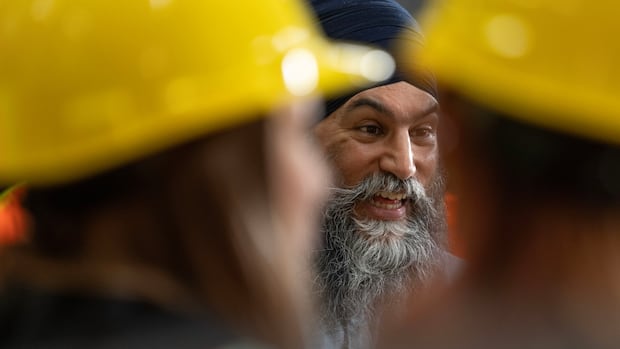As Jagmeet Singh heads into his third week of campaigning, the NDP leader is dropping his assertive messaging that he is running to be prime minister.
Singh is no longer explicitly repeating the line at news conferences.
On Wednesday and Friday, CBC News asked Singh if he was still running for the country’s top political job.
Without directly answering, he invoked the past two minority Parliaments, where New Democrats used their position to push for things he said the Liberals otherwise would not do.
“Everything that the Liberals are pointing to, all the things they are saying that they achieved, literally would not have happened but for us,” Singh said. “These are all things that we forced them to do.”
Singh said his party pressured the Liberals to implement pharmacare, dental care, legislation banning replacement workers, and two weeks’ paid sick leave for workers in federally regulated workplaces.
He then made the pitch for electing more New Democrats, having proven what the left-of-centre party could do with about two dozen MPs.
“So if you elect enough of us, elect more of us, we’re gonna do great work for you,” Singh said in Winnipeg on Wednesday.
NDP Leader Jagmeet Singh, speaking from Montreal on Day 13 of the election campaign, responds to a question about whether he’s still running to become prime minister amid a perceived shift in the language he’s been using on the campaign trail.
Singh still hasn’t conceded defeat
At the same time, Singh did not concede defeat nor close the door on forming a government.
Asked as recently as last Saturday, Singh said he “is running” to be prime minister. The next day, when asked again, he amended his response: “I would be honoured to serve as prime minister, and I’ll fight every single day to make sure people’s lives are better,” he said at an announcement in Port Moody, B.C. on March 30.
Along with the message change, Singh has also opened the door to working with the Liberals if they form government —while making it clear with whom he would not work.
“I don’t want to presuppose the outcome of the election, but I can tell you one thing very clearly: New Democrats, myself as leader, will never support Pierre Poilievre as prime minister,” he said last Saturday in Ottawa.
Singh’s new message track is a subtle acknowledgement of where things are with voters, who polls suggest have lined up solidly behind the Liberals, then the Conservatives. CBC’s Poll Tracker aggregates the leading national public opinion polls. Its seat modelling on Friday suggests the New Democrats could be on track to lose most of their seats, winning up to nine as of April 4; they currently hold 24.
It could also be seen as an attempt by Singh to reach out to orange voters who’ve potentially swung to other parties, and who see this election as a binary choice between the Conservatives and the Liberals. To them, Singh is making the case that a vote for the NDP would not be in vain.
It makes sense that the party might be making a different pitch to voters, according to Karl Bélanger, a former principal secretary to previous NDP leader Tom Mulcair, and now head of Traxxion Strategies.
“Everybody has seen the poll and the movement in the electorate,” said Bélanger. “So by pitching a message that is more focused on what [a] sizeable contingent of NDP MPs can do and how they can keep in check a potential majority Liberal government, you are giving a reason for New Democrats to be elected.”
Leader hits out at poll aggregators
Singh’s former communications director, Mélanie Richer, said New Democrats are also telling Canadians they’d be better off with a minority government.
She adds that with the increasing likelihood of a Liberal majority government, so-called progressive voters could see less of a need to vote strategically to prevent the Conservatives from coming to power.
NDP Leader Jagmeet Singh is no longer asking voters to make him prime minister. The Power & Politics panel of party insiders debate how the call to elect NDP MPs to hold a potential Liberal minority government to account will play out on election day.
“When we’re seeing that kind of majority territory for the Liberals, that’s where we see people give themselves permission to vote for the person they want,” Richer said. “So we see folks move in Toronto, and places like Montreal vote for the things they want to make happen, and that is where we see more NDP come into the mix.”
As for Singh, while he may not be so emboldened anymore to directly say that he’s running for prime minister, he’s made it clear he’s confident his party is not on track for total annihilation.
On Friday in Montreal, he dismissed polling aggregators, in one of his sharpest rebukes of the modelling.
“These aggregators were massively wrong,” Singh said about poll modelling in the past, though he didn’t provide examples. “So I’m not worried about what aggregators say.
“I’m worried about what’s going on in our country.”


